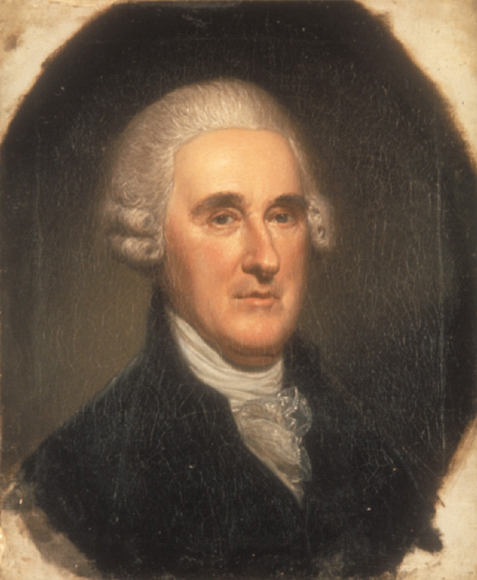Thomas McKean (1734–1817)
Independence National Historic Park
Oil on canvas, 27-3/16 x 22-1/16 in. (after 1787)
At the time of Lewis’s first visit to Philadelphia, McKean was at the close of the second of his three terms (the constitutional limit) as governor of Pennsylvania—the first pro-Jefferson, anti-Federalist governor in the nation. He was a signer (as a delegate from Delaware) of the Declaration of Independence and was the only man to serve continuously from the Stamp Act Congress[1]The Stamp Act Congress was a meeting of delegates from nine colonies in New York (October 1765) protesting Parliament’s imposition of a tax without consent of the colonial legislatures. Revenue … Continue reading through the Second Continental Congress.[2]The Second Continental Congress, composed of delegates from all colonies, convened in Philadelphia in April 1775. Conflict had already occurred in Massachusetts, and sentiment gradually grew for … Continue reading He had been Chief Justice of the Pennsylvania Supreme Court for 22 years beginning in 1777. His biographer considers that only the historiographical difficulty of reviewing court records and other scattered documents prevents recognition that McKean rather than John Marshall “did more than anyone else to establish an independent judiciary in the United States.”[3]John M. Coleman, Thomas McKean (Rockaway, New Jersey: American Faculty Press, 1975).
As chief justice under a Pennsylvania constitution he considered flawed, he assumed it the right of the court to strike down legislative acts it deemed unconstitutional, preceding by ten years the U.S. Supreme Court’s establishment of the doctrine of judicial review. He augmented the rights of defendants and sought penal reform, but on the other hand was slow to recognize expansion of the legal rights of women and the processes in the state’s gradual elimination of slavery. He as governor, and Thomas Jefferson as Secretary of State, were in sympathy with the effort to counter the cries for war with France (1798), and provided accreditation for Logan’s celebrated (or decried) peace-seeking trip to France. He inaugurated the spoils system—the post-election awarding of governmental offices to supporters—in Pennsylvania and advocated its use in Jefferson’s national administration. But by his third term he was removing members of his own party who opposed him, and naming relatives to office. He escaped impeachment by the force of his own defense and the work of friends.
Notes
| ↑1 | The Stamp Act Congress was a meeting of delegates from nine colonies in New York (October 1765) protesting Parliament’s imposition of a tax without consent of the colonial legislatures. Revenue for defense of the colonies was to be provided by sale of stamps affixed to documents and papers produced in the colonies. The protest was successful; Parliament repealed the tax in 1766. |
|---|---|
| ↑2 | The Second Continental Congress, composed of delegates from all colonies, convened in Philadelphia in April 1775. Conflict had already occurred in Massachusetts, and sentiment gradually grew for independence from the Crown. From the Declaration of July 1776 until 1789, the Congress, weak and with limited means, pursued the goal of securing that independence. |
| ↑3 | John M. Coleman, Thomas McKean (Rockaway, New Jersey: American Faculty Press, 1975). |

